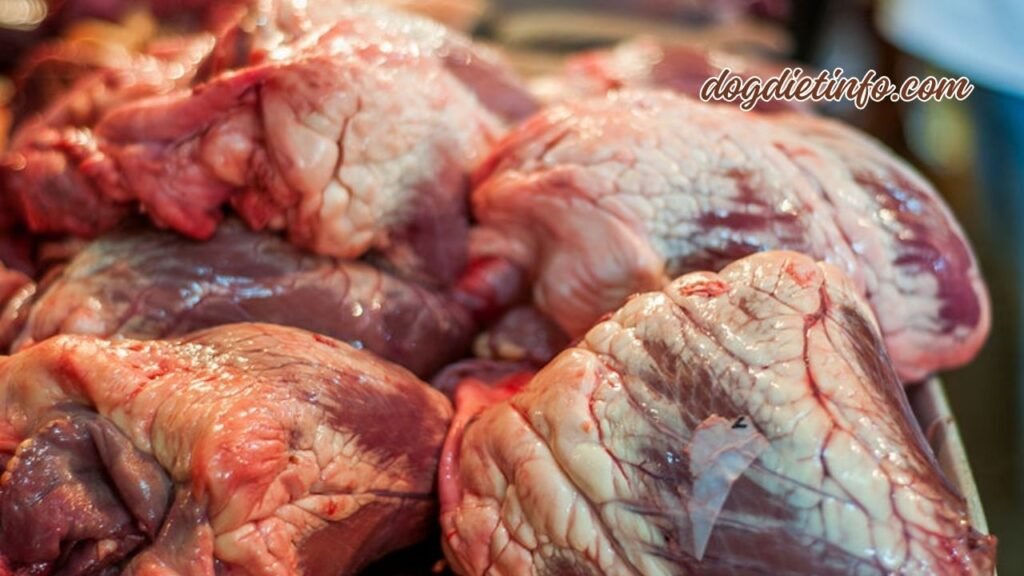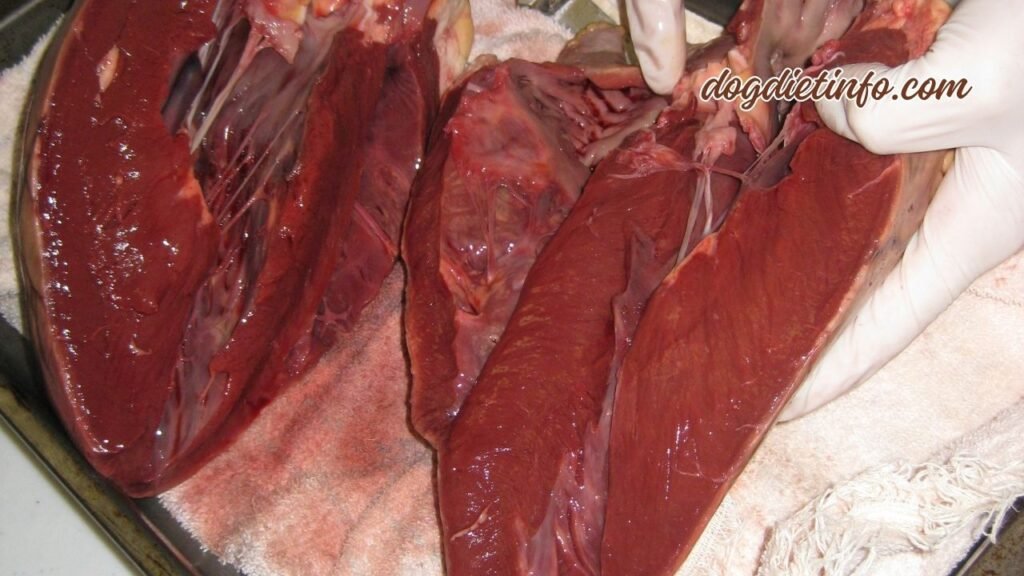Is Beef Heart Good For Dogs? Beef heart is a nutrient-rich organ meat that can be a great source of protein, vitamins, and minerals for dogs.
As a responsible dog owner, ensuring that your dog gets the right nutrition is one of your top priorities. Lately, the topic of feeding dogs organ meats, particularly beef heart, has gained traction in the pet community.
This nutrient-dense organ offers a range of health benefits that can support your dog’s overall well-being, from enhancing muscle growth to boosting heart health.
However, while beef heart is packed with essential nutrients, it’s crucial to understand how to properly incorporate it into your dog’s diet for the best results.
In this comprehensive guide, we’ll explore why beef heart can be a valuable addition to your dog’s meals, the benefits it provides, how to serve it, potential risks, and answers to common questions.
So, is beef heart good for dogs? Let’s dive in and find out.
Contents
What Is Beef Heart?
Definition of Beef Heart:
Beef heart is the heart muscle from a cow and is categorized as organ meat. [Is Beef Heart Good For Dogs?]
However, unlike other organs like the liver or kidneys, the heart is considered a muscle, similar to steak or ground beef, but with a much richer nutrient profile.
While many pet owners primarily rely on traditional cuts of meat for their dog’s protein, incorporating organ meats like beef heart can offer unique health benefits.
Nutritional Composition:
Beef heart is rich in protein, iron, and other essential vitamins and minerals. A 100-gram serving of beef heart contains about 20 grams of protein and a variety of nutrients, including vitamin B12, riboflavin, niacin, phosphorus, and zinc.
Additionally, it’s low in fat compared to other meats, making it an excellent lean protein source. One of its most significant nutritional components is Coenzyme Q10 (CoQ10), which plays a crucial role in maintaining cardiovascular health and overall cell function.
6 Reasons Why Beef Heart Is Good for Dogs
1. High Protein Content:
Protein is the building block of muscles and tissues in your dog’s body, and beef heart offers a high-quality source of this essential nutrient.
The protein found in beef heart not only supports muscle growth but also aids in tissue repair, which is particularly important for active dogs, working dogs, or dogs recovering from injury.
Protein also plays a role in creating hormones and enzymes that are critical for overall bodily function.
2. Rich in Taurine:
Taurine is an amino acid that is vital for your dog’s cardiovascular health. [Is Beef Heart Good For Dogs?]
Certain dog breeds, including golden retrievers, boxers, and Doberman pinschers, are genetically predisposed to taurine deficiency, which can lead to serious heart conditions like dilated cardiomyopathy (DCM).
Beef heart is naturally rich in taurine, making it an excellent choice to help support heart health and prevent deficiencies that could lead to severe health problems.
Including taurine-rich foods like beef heart in your dog’s diet can be a proactive step in maintaining their heart health.

3. Packed with Vitamins:
Beef heart is a great source of B vitamins, particularly vitamin B12, which is essential for maintaining a healthy nervous system and promoting the production of red blood cells.
Vitamin B12 plays a crucial role in DNA synthesis, brain function, and energy production. Iron, another key nutrient found in beef heart, helps prevent anemia by supporting red blood cell production.
Dogs need adequate levels of iron to maintain their stamina, alertness, and overall energy levels. [Is Beef Heart Good For Dogs?]
4. Great Source of CoQ10:
Coenzyme Q10 (CoQ10) is an important antioxidant that plays a significant role in energy production within cells and protects them from oxidative damage.
This antioxidant is essential for dogs as it supports heart health, promotes healthy aging, and may even help improve overall vitality.
As dogs age, their natural levels of CoQ10 may decline, which is why including CoQ10-rich foods like beef heart can support longevity and sustained energy levels in senior dogs.
5. Low in Fat:
Unlike other cuts of beef that can be high in saturated fats, beef heart is relatively low in fat, making it an ideal protein source for dogs that need to maintain a healthy weight.
Lean meats like beef heart are perfect for dogs prone to obesity or those with conditions that require lower-fat diets, such as pancreatitis.
By incorporating lean protein like beef heart into their diet, you’re helping to manage their weight while still providing essential nutrients.
6. Overall Energy Levels:
Thanks to its rich combination of proteins, B vitamins, iron, and CoQ10, beef heart is a great energy booster for dogs. [Is Beef Heart Good For Dogs?]
Whether you have a high-energy breed or a dog that needs a bit more pep in their step, beef heart can help support sustained energy throughout the day.
This is particularly important for working dogs, senior dogs, or those recovering from illness or surgery, where energy levels may need additional support.
How to Feed Beef Heart to Your Dog
Raw vs Cooked
One of the first decisions you’ll need to make when feeding beef heart to your dog is whether to serve it raw or cooked. [Is Beef Heart Good For Dogs?]
Both methods have their advantages, and the choice ultimately depends on your dog’s dietary needs and your level of comfort with feeding raw food.
- Raw Beef Heart: Raw beef heart retains all of its natural nutrients, making it a great option if you’re feeding your dog a raw diet or following a prey model diet. However, raw meat can carry bacteria like salmonella or E. coli, so it’s essential to source your beef heart from a reputable supplier and handle it safely. If you’re new to raw feeding, consult your veterinarian to ensure you’re meeting your dog’s nutritional needs.
- Cooked Beef Heart: Cooking beef heart can make it safer for dogs with sensitive stomachs or immune system issues. Lightly cooking beef heart through methods like boiling or searing can help reduce the risk of bacteria while retaining most of its nutrient content. Avoid adding any seasoning, oils, or fats when cooking beef heart for dogs, as these can upset their digestive system. [Is Beef Heart Good For Dogs?]
Serving Suggestions:
When it comes to serving beef heart to your dog, it’s important to introduce it gradually, especially if it’s a new addition to their diet.
Beef heart can be diced into small, bite-sized pieces or ground and mixed into their regular food. If you’re feeding a raw diet, aim to feed beef heart as part of 10-15% of the total organ meat in your dog’s diet.
For dogs eating a traditional kibble or cooked food diet, beef heart can be served as an occasional treat or protein supplement. [Is Beef Heart Good For Dogs?]
The recommended portion size is generally 2-3% of your dog’s body weight per day, but this will vary depending on their activity level, breed, and dietary needs. Be sure to consult your veterinarian for specific portion recommendations.
Precautions to Take:
As nutritious as beef heart is, it’s essential to feed it in moderation. While organ meats like beef heart are rich in vitamins and minerals, overfeeding can lead to nutrient imbalances.
Too much organ meat, particularly liver, can lead to an overdose of certain vitamins, such as vitamin A, which can be harmful to your dog’s health.
Always balance your dog’s diet with other protein sources, vegetables, and grains to ensure they’re getting all the nutrients they need. [Is Beef Heart Good For Dogs?]

Are There Any Risks of Feeding Beef Heart to Dogs?
Balance in the Diet:
While beef heart is nutrient-dense, it shouldn’t make up the entirety of your dog’s diet. Feeding too much organ meat can lead to nutrient imbalances.
For example, organs like liver and kidneys are rich in vitamins A and D, and an excessive intake can result in hypervitaminosis, or vitamin overdose.
To prevent this, it’s essential to offer a variety of protein sources and ensure beef heart makes up only a portion of your dog’s overall diet.
Allergies or Sensitivities:
Although beef heart is generally well-tolerated by dogs, some dogs may have allergies or sensitivities to beef or organ meats.
If you’re introducing beef heart into your dog’s diet for the first time, start with small portions and observe for any adverse reactions such as vomiting, diarrhea, or skin irritation.
If your dog has a known beef allergy, consider using other organ meats like chicken hearts or lamb hearts. [Is Beef Heart Good For Dogs?]
Overfeeding Concerns:
Overfeeding any organ meat can be harmful. While beef heart is low in fat, feeding large amounts of it regularly can still upset the balance of your dog’s diet.
To avoid overfeeding, consider beef heart as an occasional treat or supplement rather than a primary protein source.
Final Verdict
Beef heart is a highly nutritious addition to your dog’s diet when fed in moderation. [Is Beef Heart Good For Dogs?]
Its high-quality protein, rich taurine content, essential vitamins, and CoQ10 make it a great option for supporting muscle growth, cardiovascular health, and overall energy levels.
However, like any new food, it’s important to introduce beef heart gradually and ensure your dog’s diet remains balanced with other protein sources and nutrients.
See Also: Is Beef Hide Safe For Dogs?
FAQs
Can puppies eat beef heart?
Yes, puppies can eat beef heart, but it should be introduced slowly and fed in moderation as part of a balanced diet. Start with small portions and monitor your puppy’s reaction.
Is beef heart safe for dogs with heart conditions?
Beef heart is rich in taurine, an amino acid that supports heart health. While it can be beneficial for dogs with heart conditions, it’s always best to consult your veterinarian before making dietary changes, especially if your dog is on medication or has a serious heart condition.
How often can I feed my dog beef heart?
Beef heart can be fed once or twice a week as a supplement to your dog’s regular diet. It should not make up the majority of their protein intake but can be a healthy addition to their meals.
Can dogs with sensitive stomachs eat beef heart?
Some dogs with sensitive stomachs may tolerate cooked beef heart better than raw. Start with small portions and monitor for any signs of digestive upset, such as vomiting or diarrhea.
What other organ meats are good for dogs?
Other organ meats that are beneficial for dogs include liver, kidney, and chicken hearts. These organs provide different nutrients that support various aspects of your dog’s health, such as liver’s high vitamin A content and kidney’s excellent iron levels.
Conclusion: Is Beef Heart Good For Dogs?
Feeding beef heart to your dog is a great way to provide them with essential nutrients that promote heart health, energy, and muscle growth.
Whether you choose to feed it raw or cooked, beef heart can be a valuable addition to their diet when served in moderation. [Is Beef Heart Good For Dogs?]
Remember to consult with your veterinarian to ensure that you’re feeding the right portions and that beef heart complements the rest of your dog’s balanced diet.
With the right approach, your dog can enjoy the benefits of this nutrient-packed organ meat, leading to a happier, healthier life.

Derrick Wilcox is a certified canine behaviorist with over 12 years of experience at Happy Paws Animal Clinic and Pawsitive Training Center, helping pet owners ensure safer, healthier, and happier lives for their dogs.



